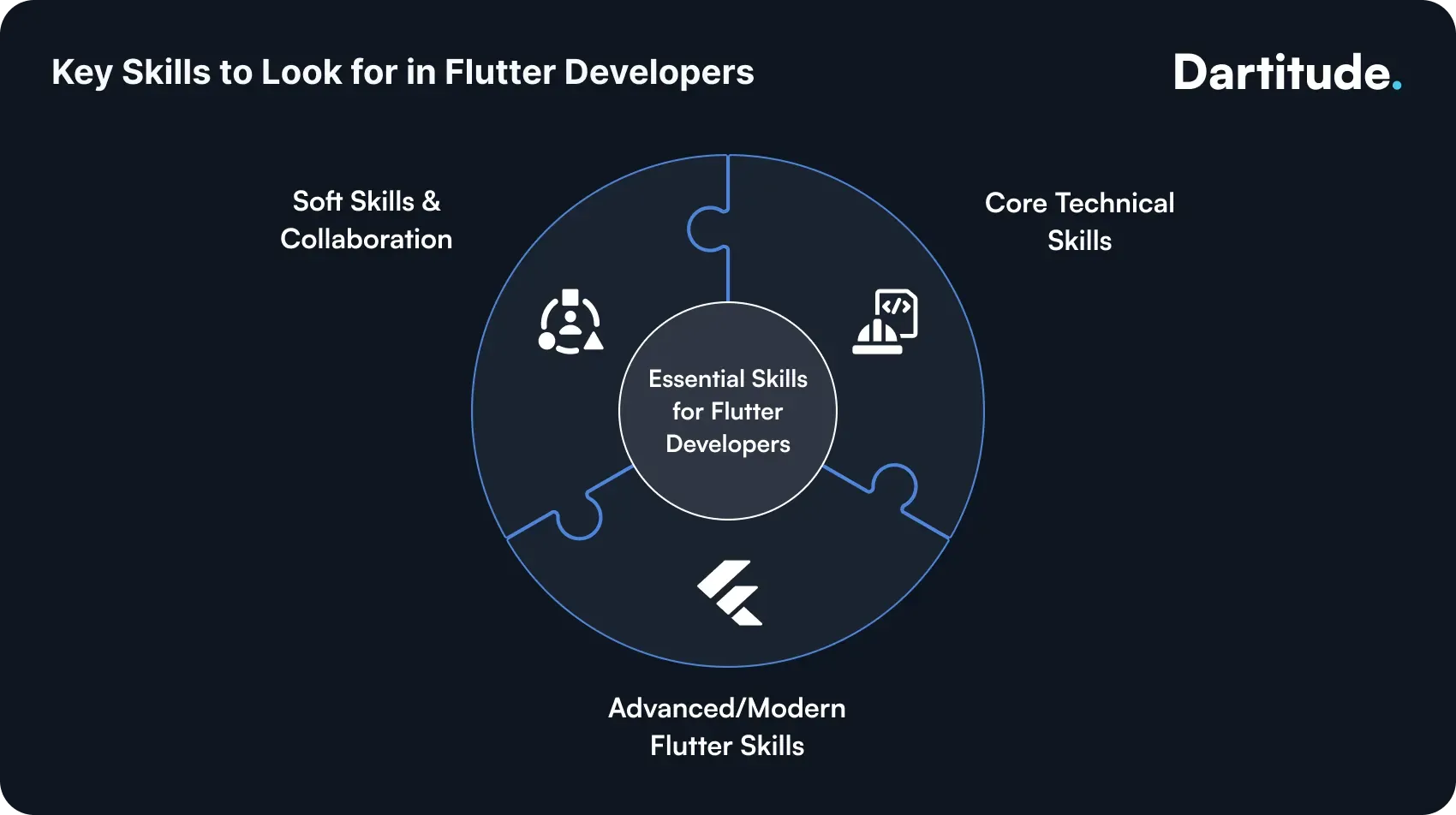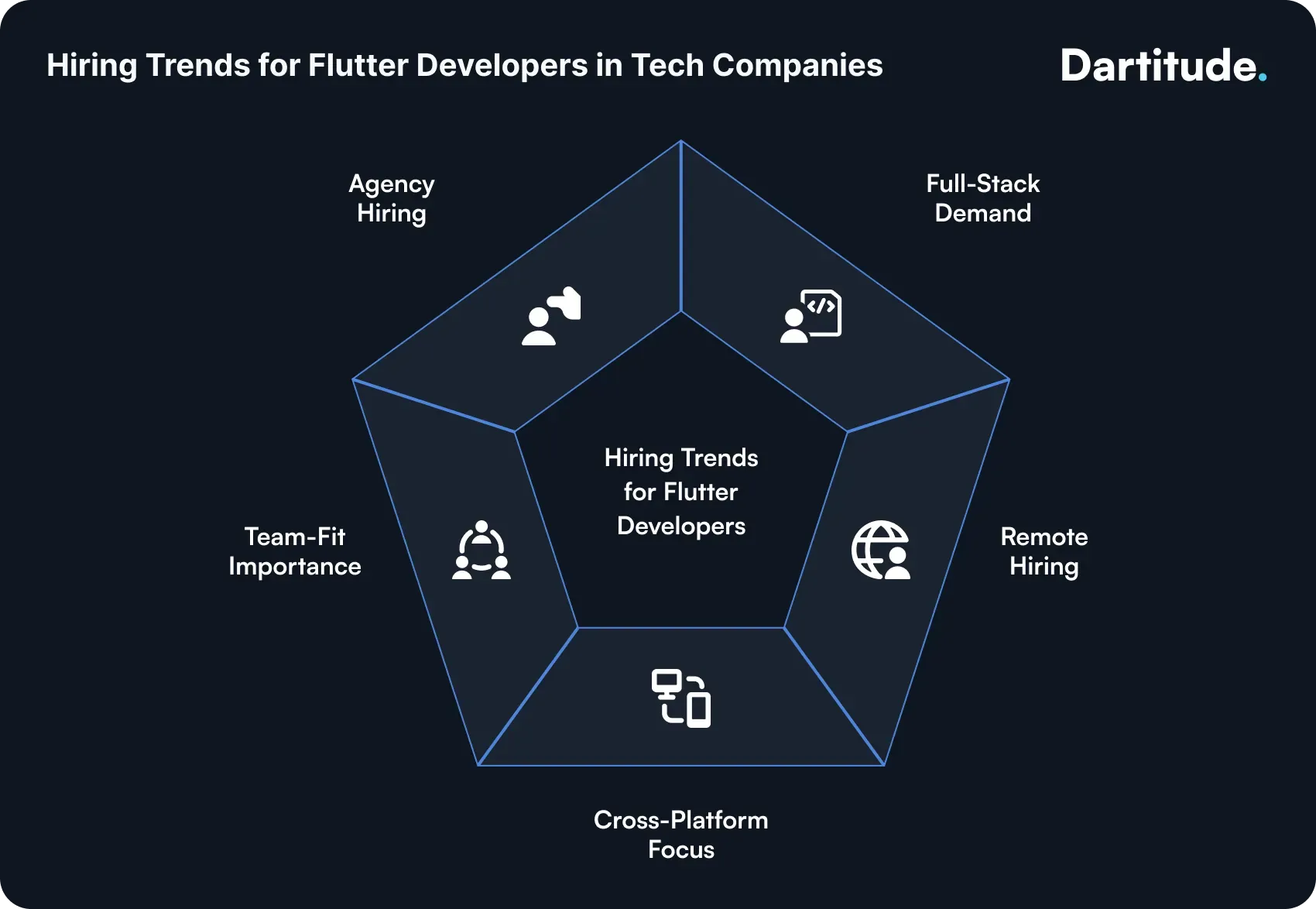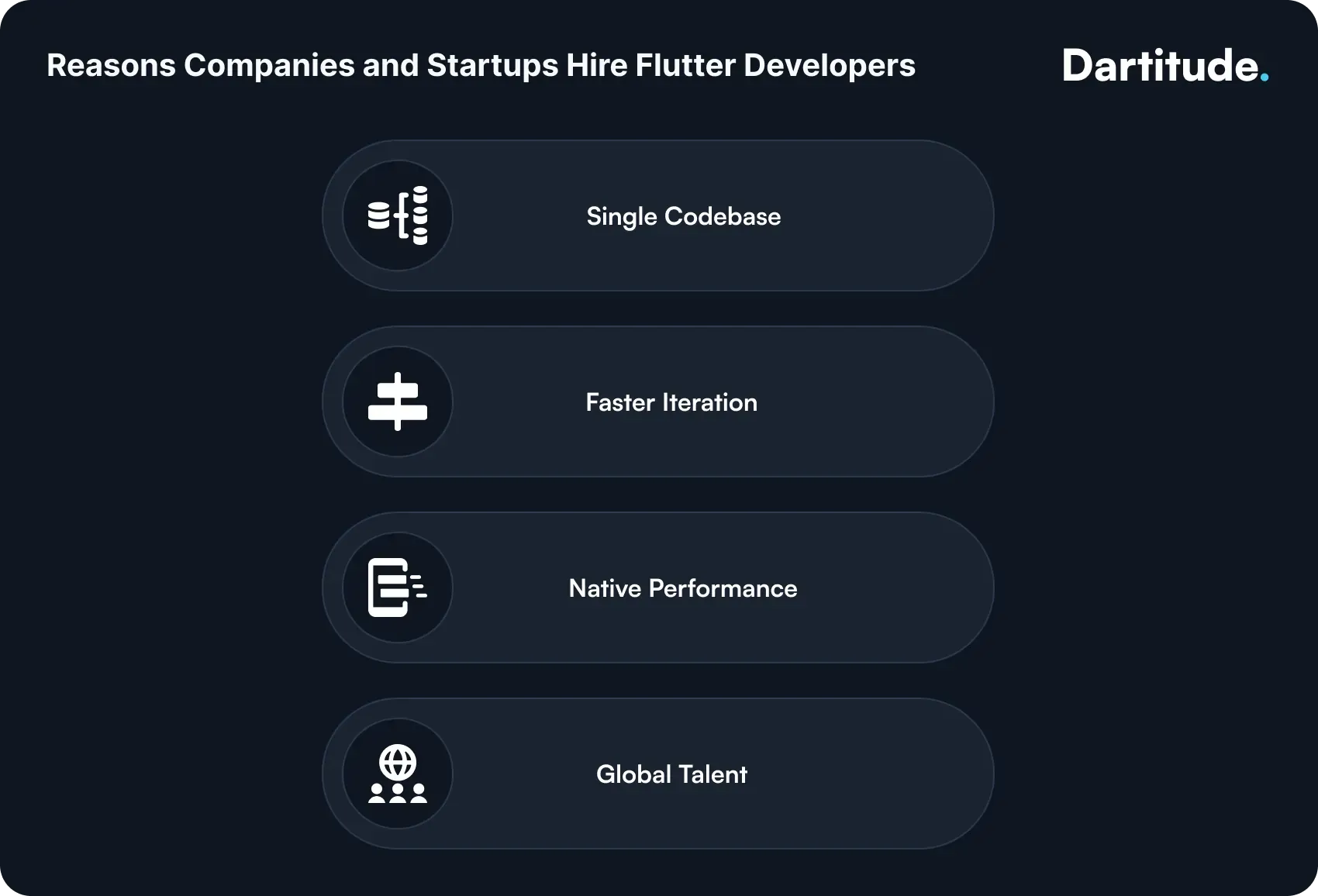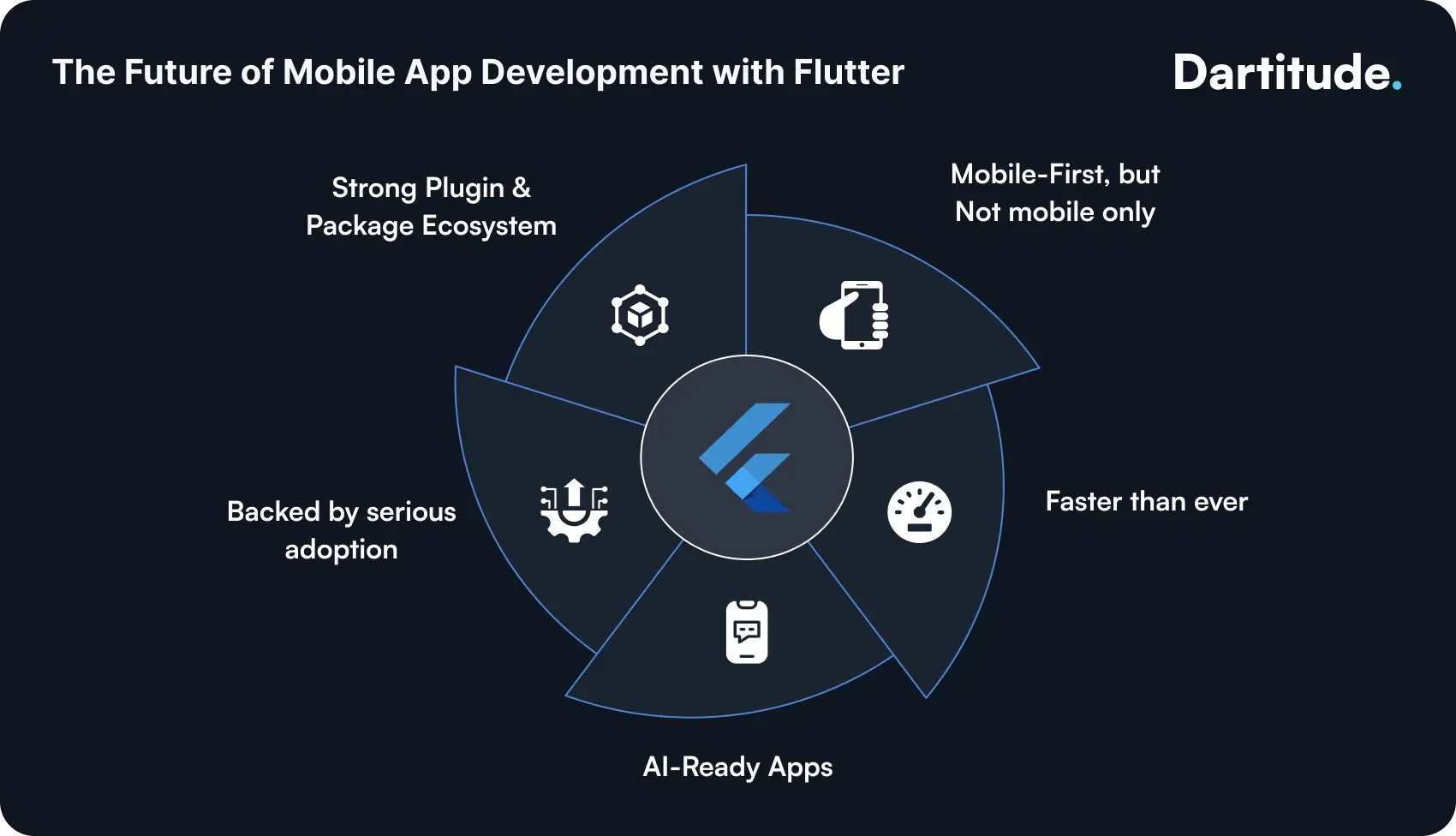
Why Hire Flutter Developers in 2025? Trends, Skills, and Market Demand
It's very easy to decide that you need to build an App.
What comes after is the real headache for managers and recruiters.
Because you need to hire two separate teams for Android and iOS. That’s expensive, slow, and hard to manage.
That’s why startups and product teams are hiring Flutter developers.
FYI – Flutter helps you build apps that work for both iOS & Android using a single codebase.
But you might be wondering:
- Is Flutter still a good choice for app development?
- What skills do you need in a Flutter developer?
- Are there enough talented developers out there, or is it too crowded?
This blog breaks it all down.
Why Startups Should Hire Flutter Developers in 2025
Startups don’t have the luxury of time. Period. They need to launch fast, test quickly, and scale smart.
That’s exactly where Flutter developers give startups an edge in 2025.
In fact, a single codebase can work for both Android and iOS devices.
That simply means that you will need fewer resources and will have faster development cycles (without compromising on performance or design).
- Need to launch an MVP? Flutter shortens your time-to-market.
- Need to pivot quickly? One update covers both platforms.
- Need to impress investors? Flutter apps look and feel like premium native apps.
In a market where every week matters, hiring Flutter developers helps startups stay lean, move fast, and stay competitive.
Especially when bigger players are burning time managing multiple codebases.
Key Skills to Look for in Flutter Developers
 Let’s make one thing clear. You are not hiring a developer who knows Dart.
Let’s make one thing clear. You are not hiring a developer who knows Dart.
A Flutter developer must be an asset who takes ownership (as in responsibility) of building your app!
In such cases, you need developers who bring both technical depth and product thinking.
Here are the key skills to look for:
Core Technical Skills
- Dart programming language: They should be used to creating clean, efficient, and well-structured code
- Flutter SDK & widgets: Deep understanding of custom UI, layout, and animations
- State management: Experience with tools like Provider, Riverpod, BLoC, or GetX
- API integration: Should know how to work with REST APIs, GraphQL, and third-party SDKs
- Database handling: Good to have experience with Firebase, SQLite, Hive, or any other local/cloud databases
Advanced/Modern Flutter Skills
- Flutter Web & Desktop: Familiarity with building for multiple platforms
- Flutter 4.0 updates: The dev should be aware of the latest updates, like performance boosts, better DevTools, or improved rendering
- CI/CD experience: One should be able to use tools like Codemagic, GitHub Actions, or Bitrise to automate builds and test apps
- Testing & debugging: Have a knack for isolating and fixing platform-specific issues
Soft Skills & Collaboration
- Product thinking: Can understand user needs and build accordingly
- Communication: This is really important if you’re working with remote teams
- Agile mindset: One needs to be comfortable with fast iterations, feedback loops, and pivoting when needed
Hiring Trends for Flutter Developers in Tech Companies

It's not even a decade (since Flutter was launched), and Flutter has changed how app development is done.
In fact, many startups help you build Flutter apps without any code (like FlutterFlow).
This simply shows that Flutter is being embraced by tech companies that want to consolidate their tech stack and reduce Flutter development costs (+ stay agile across platforms).
But the way these companies are hiring Flutter developers has noticeably shifted. Here’s how.
Related blog: Cost to Hire a Flutter Developer
1. Demand is Shifting Toward Full-Stack Flutter devs
Companies are no longer hiring Flutter devs just to build screens. They’re hiring problem-solvers who can take ownership of end-to-end app functionality—from UI to backend integration, and even analytics.
In job descriptions, you’ll now often see: “Flutter + Firebase + CI/CD experience required” or “Must have built at least one app that’s in production across Android and iOS.”
2. Remote Hiring Isn’t Optional – It’s Strategic
In most cases, local talent is unavailable or expensive. That’s why companies are aggressively hiring remote Flutter developers from regions like Eastern Europe, India, Latin America, and Southeast Asia.
But there’s one more factor that influences this trend. In practice, remote staffing gives you flexibility and faster onboarding through agencies or pre-vetted platforms.
3. Prioritizing Cross-Platform + Cross-Functional Thinking
Tech companies are no longer hiring Flutter devs just for mobile. They're hiring them to ship across mobile, web, and desktop, with one stack and tighter feedback loops.
Companies now screen for experience with Flutter Web, modular architecture, and even performance optimization across platforms.
4. “Team-Fit” Is More Critical Than Ever
Most Flutter devs work in distributed teams now. Companies are filtering harder for devs who can work async, document well, and think product-first.
Recruiters are asking these questions:
- Have you worked on a fast-moving team before?
- Do you commit clean code and communicate blockers early?
5. Hiring via Agencies & Staff Augmentation
Instead of building teams from scratch, many product companies now work with a Flutter app development company or pre-assembled Flutter pods—a small, agile group including a dev, tester, and UI/UX lead.
This reduces hiring complexity and increases output consistency.
For a smoother hiring process, see our post on outsourcing Flutter app development.
Reasons Companies and Startups Hire Flutter Developers

Companies are investing in Flutter teams to streamline product development and scale faster across platforms.
Here’s why:
1. One Codebase = Massive Cost & Time Savings
If you use Flutter, then you won’t have to build a separate application for Android, iOS, the web, and desktop. All this can be done with the help of a single codebase. That means fewer developers are needed, and you can have relatively faster rollouts.
For most businesses, this reduces engineering costs by 30–50% compared to hiring separate native teams.
2. Faster Iteration = Faster Go-To-Market
Flutter isn’t a compromise. It delivers high-performance UIs that look and feel native.
Which is why companies in fintech, edtech, and ecommerce are using it to deliver sleek, modern apps without native overhead.
3. Near-Native Performance with Pixel-Perfect UI
Flutter isn’t a compromise. It delivers high-performance UIs that look and feel native.
Which is why companies in fintech, edtech, and ecommerce are using it to deliver sleek, modern apps without native overhead.
4. Global Talent Pool & Mature Ecosystem
Flutter has matured. There’s now a large global pool of developers who specialize in Flutter + Firebase, Flutter + Supabase, Flutter + AI, and more.
Plus, with strong backing from Google and a huge plugin ecosystem, companies aren’t worried about long-term platform risk.
What’s the Current Demand for Cross-Platform Talent
The demand for cross-platform developers—especially Flutter devs—is peaking in 2025. Here’s what’s driving it:
- High demand, low supply: Everyone wants Flutter talent, but senior devs with real product experience are still limited.
- Native roles are shrinking: Companies are consolidating Android/iOS teams into one cross-platform team using Flutter.
- Global hiring is booming: US/EU firms are outsourcing more to LATAM, India, and Eastern Europe
SEA and MENA startups are adopting Flutter for fintech and logistics apps
- Real use cases that drive hiring: SaaS and fintech apps going multi-platform
Ecommerce platforms launching web + mobile with one team
Enterprises modernizing legacy systems with Flutter
In short: If your app needs to scale fast across platforms, cross-platform Flutter talent is no longer optional—it’s a competitive advantage.
The Future of Mobile App Development with Flutter

Flutter has moved far beyond just mobile. It’s positioned to lead the next wave of cross-platform development.
Here’s why:
- Built for mobile. Ready for more.
Flutter started with iOS and Android, but now it also supports web, desktop (macOS, Windows, Linux), and even embedded screens. All this while keeping the same code and consistent UI.
- It’s faster than ever before
With the latest upgrades (Flutter 4.0+), apps compile quicker and run smoother. Animations are buttery. Performance? Often just as fast—or faster—than native apps.
- Perfect for AI-powered apps
Developers are now combining Flutter with AI tools like Gemini or GPT to build smart chatbots, personal assistants, and predictive UIs. Flutter makes it easier to ship AI-first features across platforms.
- Big brands are all in
Google, Toyota, ByteDance, Alibaba—they’re not experimenting. They’re using Flutter in production. That kind of trust signals long-term stability and support.
- A ready ecosystem
Payments, maps, analytics, camera, Bluetooth—you name it. Flutter’s plugin and package library has matured. You can now build almost anything without hitting roadblocks.
So what’s next?
Flutter is no longer the “experimental” framework. It’s quickly becoming the go-to choice for product teams that want speed, flexibility, and scalability with the least dependency on tech.
If you're building a mobile app in 2025, Flutter is very likely your best bet.
Conclusion
In 2025, hiring Flutter developers isn’t about choosing a tech stack—it’s about choosing a faster, leaner way to build products in a market where time-to-market and team efficiency define who survives.
The reality?
- Investors don’t care what you’re building with—they care when you ship.
- Users don’t ask if your app was built natively—they expect it to work perfectly on day one.
- Your burn rate doesn’t wait for your engineering team to scale.
Flutter solves all three.
It compresses timelines, cuts dev costs, and gives you one streamlined team instead of three disconnected ones. But the real edge?
Hiring Flutter developers gives your startup velocity. And in a world where most companies move slowly, speed is your moat.
If you’re still debating whether to hire Flutter devs in 2025, you’re asking the wrong question.
You should be asking: How fast can I hire a high-performing Flutter team—before my competitors do?
FAQs
1. Is Flutter still relevant in 2025?
Yes—more than ever. Flutter has grown into one of the most trusted tools for building apps. Google backs it, top brands use it, and it’s now the go-to choice for startups that want to build for both iOS and Android fast.
2. Why hire Flutter developers instead of native iOS/Android devs?
Because one good Flutter developer can do both. You don’t need two teams, two timelines, or double the cost. Flutter keeps things lean—faster builds, easier updates, and less hassle all around.
3. Can Flutter handle complex or large-scale apps?
Yes. There are many examples where Flutter is used to build complicated apps like Google Ads, Google Pay, and eBay Motors. The list is never ending, but you get the idea - Sky is the limit.
4. What does a great Flutter developer look like in 2025?
They’ve shipped at least one real app across Android & iOS, understand state management, clean architecture, CI/CD, and can work async with strong communication. Bonus: Flutter Web or Firebase experience.
5. Is it better to hire a freelancer, in-house dev, or agency?
To be honest, it depends on your speed and scale.
- Freelancer: Great for small fixes, risky for full builds
- In-house: Long-term control but slow hiring
- Specialized agency: Fastest route to a pre-built team, especially for MVPs or scaling up
6. Where can I find vetted Flutter developers fast?
Hiring on your own can take weeks. If you want to move faster, you will need a product-driven team like Dartitude. They live and breathe Flutter.



